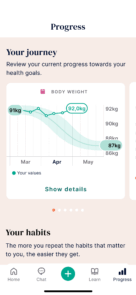
Dr. Vicky Lawson
With a Professional Doctorate in Health Psychology and certifications in CBT for Eating Disorders and Dynamic Interpersonal Therapy, Dr. Vicky Lawson brings expertise in integrating behaviour change strategies into weight management programmes.
Get to know Victoria and her work at Oviva.
What inspired you to become a psychologist?
Victoria: I started off training as a health psychologist because of my interest in how our physical and mental health interact.My personal interest in eating behaviours, physical activity and weight management came from growing up in a family where weight has always been an issue. I was very overweight when younger and tried many things to lose weight. When I started applying the evidence-based practice from my psychology training things began to change. Because of my lived experience, I have some understanding of the challenges of living with overweight, including weight stigma both from my own experience and that of other family members. This informs my approach to advocacy and change for people living with overweight/obesity.
What certifications have you attained?
Victoria:
HCPC registered chartered health psychologist, Professional Doctorate in Health Psychology (UWE), Health Psychology MSc (UCL), Certificate of Enhanced CBT for Eating Disorders (Oxford), NHS post-graduate certificate in Dynamic Interpersonal Therapy (Anna Freud Centre). Certified nutritionist (Level 4, Royal Society of Public Health) Qualified yoga teacher
Success in weight management is not just about reaching a particular number on the scale; it’s about making sustainable, long-term changes that enhance overall well-being.
Where can we find your published work?
Victoria:
Trickey, D., Lawson, V. (2023) Helping your child with loss and trauma. Little Brown Publishing.
Lawson, V., Nicinska, B., Schirmann, F., Debrou, L., Huntriss, L., Thompson, H., Jones, C.W., & Jones, L (2022) What impact can digitally delivered health care for complex obesity have on depression severity? A service evaluation. Clinical Psychology Forum, (351).
Soni, A., Beeken, R.J., McGowan, L., Lawson, V., Chadwick, P. and Croker, H. (2021) Shape-Up’, a Modified Cognitive-Behavioural Community Programme for Weight Management: Real-World Evaluation as an Approach for Delivering Public Health Goals. Nutrients, 13(8), p.2807.
Grace, C., Lawson, V. (2019) Overcoming Weight Problems. Little Brown Publishing.
Measures, J., & Lawson, V. (2018) Designing successful diabetes preventions programmes:
using the COM-B framework to understand why change happens. Poster presentation. Progressing Diabetes Prevention National Networking Forum, 26 September, Manchester.
Lawson, V., & Lee, E. (2018) Physical activity for mental health: views of Southwark IAPT service users. Poster presentation: BPS Division of Health Psychology annual conference, Newcastle UK.
Barley, E., & Lawson, V. (2016). Using health psychology to help patients: promoting healthy choices. British Journal of Nursing, 25(21), 1172-1175.
Barley, E., & Lawson, V. (2016). Health psychology: supporting the self-management of long-term conditions. British Journal of Nursing, 25(20), 1102-1107.
Barley, E., & Lawson, V. (2016). Using health psychology to help patients: common mental health disorders and psychological distress. British Journal of Nursing, 25(17).
Barley, E., & Lawson, V. (2016). Using health psychology to help patients: theories of behaviour change. British Journal of Nursing, 25(16).
Barley, E., & Lawson, V. (2016). Using health psychology to help patients: promoting wellbeing. British Journal of Nursing, 25(15).
Barley, E. and Lawson, V., 2016. Using health psychology techniques to manage chronic physical symptoms. British Journal of Nursing, 25(22).
Lawson, V., Vielman, M., & Wilson, M. (2016) Social action through local partnership. Oral presentation at the meeting of the SLaM NHS Trust Annual Conference, London, UK.
Moss, T. P., Lawson, V., & Liu, C. Y. (2015). The Taiwanese Derriford Appearance Scale: The translation and validation of a scale to measure individual responses to living with problems of appearance. PsyCh journal, 4(3), 138-145.
Lawson, V., Marossy, A., Piper, C., & Griffiths, Z. (2015) The psychological wellbeing of participants with pre-diabetes prior to attending a Diabetes Prevention Programme. Poster presentation: BPS Division of Health Psychology annual conference, London, England.
Moss, T.P., Bailey, C., Griffiths, C., Lawson, V. & Williams, H. (2014). The Appearance Behaviour Scale: Development of a new valid and reliable measure for assessing psychosocial adjustment to self-consciousness of appearance in 11-18 year olds. PeerJ
Grimmett, C., Simon, A., Lawson, V., & Wardle, J. (2014). Diet and physical activity intervention in colorectal cancer survivors: A feasibility study. European Journal of Oncology Nursing.
Moss, T.P., White, P. & Lawson, V. (2014) Salience and valence of appearance self-consciousness in a clinical population: Psychometric validation of the CARSAL/CARVAL measurement tool. PloS one 9.2 (2014): e88435.
Lawson, V. (2014) Do leaflets that promote physical activity and/or healthy eating for weight management change behaviour? A systematic review. Poster presentation: BPS Division of Health Psychology annual conference, York, England.
Lawson, V., & Wardle, J. (2013). An exploration of the health promotion effects of varying body size in photographs analysed using Interpretative Phenomenological Analysis. Body Image, 10(1), 85–94.
Lawson, V. (2012). Appearance concerns, dietary restriction and disordered eating. In Rumsey, N. & Harcourt, D. (Eds.), Oxford Handbook of the Psychology of Appearance. (pp. 320-329). Oxford, England: Oxford University Press.
Lawson, V. (2010) Can a picture paint a thousand words? A qualitative study of photographic images used in health promotion. Poster presentation: Appearance Matters annual conference, Bristol, England.
Lawson, V., (2010) Small changes can make a big difference: Addressing childhood obesity in practice. National Association of Primary Care Review, 8(2), 268-270.
Lawson, V., & Shoneye, C. (2008) Overweight health professionals giving weight management advice: The perceptions of health professionals and overweight people. In Healthy Weight, Healthy Lives: A Toolkit for developing local strategies. Cross-Government Obesity Unit. London: Department of Health and Department for Children, Schools and Families.
Many failed attempts are often the result of rigid, restrictive diets that are difficult to maintain. A more sustainable approach focuses on balanced eating and finding pleasure in nourishing the body, rather than punishing it. It’s about creating a lifestyle that can be maintained, rather than chasing quick fixes.”
What is your favorite App feature?
Victoria: Tracking, particularly food. My own personal experience (borne out by strong evidence) is that consistent food tracking is the key to understanding our eating and managing weight.
What would you say to people who believe, after many failed attempts, that they will never achieve weight loss success?
Victoria: As a psychologist working in weight management, I would first acknowledge how difficult and disheartening it can feel after multiple unsuccessful attempts at weight loss. It’s important to validate those emotions, but I would also encourage a shift in perspective by addressing the following:
- Focus on progress, not perfection
Success in weight management is not just about reaching a particular number on the scale; it’s about making sustainable, long-term changes that enhance overall well-being. Even small changes in behavior—like improving meal patterns, increasing physical activity, or building a healthier relationship with food—are significant victories. Progress often comes in small steps, and each step forward is a sign of growth. - Break free from the diet mentality
Many failed attempts are often the result of rigid, restrictive diets that are difficult to maintain. I would explain that diets emphasizing deprivation can trigger cycles of binge eating and feelings of failure. A more sustainable approach focuses on balanced eating and finding pleasure in nourishing the body, rather than punishing it. It’s about creating a lifestyle that can be maintained, rather than chasing quick fixes. - Weight loss is about more than willpower
Weight management is complex, and it’s not just a matter of willpower or motivation. Factors like genetics, hormones, emotional well-being, and environment all play a role. Many people need support, whether that’s through psychological therapy, medical interventions, or social support. It’s important to remember that seeking help isn’t a sign of failure—it’s part of the process. - Reframe the meaning of success?
Is this a number on the scales or finding a healthier and more compassionate relationship with your body, food, and physical activity? The latter! I would encourage the person to focus on how they feel—more energy, better mood, improved health markers—rather than being solely fixated on weight loss as the only measure of success.
By moving toward a holistic, compassionate, and sustainable approach, it’s possible to find a path to health and well-being that works in the long term.
Celebrate small victories, be patient with yourself, and keep in mind that sustainable change is about progress, not a finish line. Your health journey is yours to own, and every effort you make matters.




